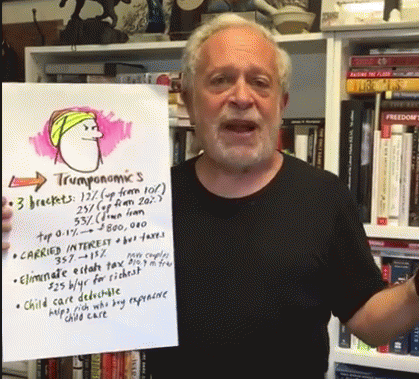Robert Reich breaks down Trumponomics from a speech Trump gave this week to a prestigious forum that presidential candidates have traditionally presented to during their campaigns:
It is not pretty. It is certainly not in favor of the "working man and woman" whose taxes would go up and not down if they, like 99.9% (literally) of taxpayers would fall into the bottom 2 of 3 tax brackets that Trump would replace the current 7 brackets with. Only the top 1/10th% would see a tax decrease. Additionally, companies would get a 15% tax rate, down from the current loophole-ridden 35% that no large corporation actually pays. While the carried interest loophole for hedge fund managers and private equity would go away under Trumponomics, the lower overall tax rate of 15% would amount to a net savings, under simplified returns, for those already fabulously wealthy people.
As Reich says, this amounts to a greater regressive tax system than anything Reagan has proposed, or even Paul Ryan. It is so far skewed towards inequity and for the billionaires like himself, that one has to wonder whether he had help in devising it from other billionaires.
Well...he probably did.
Donald J. Trump may rail against Wall Street and business elites at his campaign rallies, but that has not stopped him from turning to many of them for economic advice. On Friday, Mr. Trump announced his economic team, just days before he is expected to give a speech in Detroit on Monday about what he would do to improve American growth.
The 13-member team -- all men -- includes several billionaire bankers and investment managers, and even a part-time professional poker player. Many have been in business with Mr. Trump before. Having such moguls on the team not only expands Mr. Trump's network of Wall Street donors and contacts, but may also reassure the financial community that it need not be too alarmed by some of the candidate's populist oratory.
Trump likes to associate with people as much like him as possible, if not his family, than those who will never seriously disagree with him. The Detroit speech the Times refers to is the one now helpfully dissected by former labor secretary Robert Reich.
Reich identifies and agrees with Trump's position (and Bernie Sanders) against the Trans-Pacific Partnership - ironically about the only Obama proposal, first worked on by the Bush II Administration - that Republicans are onboard with. Or...at least they were. In a recent twist, Republican Senate and House leaders including Mitch McConnell, are now saying that Obama's plan to pass the TPP in the lame duck session will not happen. The collapse of the TPP may be the only good thing to come out of the Trump candidacy, but that pro-worker, pro-environment move is not representative of Trump's views overall, which include: eliminating the minimum wage, eliminating the EPA, and generally pursuing pro-business and anti-worker policies (these last two are not necessarily mutually exclusive,* though they are to Trump).
Trumponomics is, as Reich points out, "supply side economics on steroids." It is dangerous, and so far off the Right side of the scale that his followers probably won't believe it, or even, sadly, understand it.
**UPDATE** The New York Times posted a headline in-depth analysis of the speech that mostly supports Reich's views.
The Times assessment disagrees with Reich for middle class taxpayers, saying:
Mr. Trump said, accurately, that the proposal he has now adopted would reduce federal taxes across the board. But he failed to mention that the wealthy would disproportionally benefit. An analysis by the Tax Foundation found that it would increase after-tax income for middle-income families (those in the 40th to 60th percentile) by 0.2 percent. It would increase after-tax income for the wealthiest 1 percent of Americans by 5.3 percent.
But adding that the study was done by
The conservative-leaning foundation (and that they) found that the plan would reduce revenue by $2.4 trillion over the coming decade using "static analysis," but that it would result in a comparatively modest revenue reduction of about $200 billion if you assume that lower taxes will result in much stronger economic growth.
Reich, among most progressive economists, does not believe that more supply side policies will result in greater growth and so does not count that in his analysis.
And the Times further notes that, as has happened with Trump's proposals in the past:
Other elements of Mr. Trump's economic agenda lack details that would make similar analysis possible. He proposed a moratorium on new regulations that would certainly warm the hearts of business interests that have complained of excessive regulation in the Obama era. But it is hard to know how much of a factor regulation has been in the sluggish economic growth of the last several years.
The Times also notes that Trump was interrupted by hecklers "roughly a dozen times." Apparently, his populist message is not playing well with the actual substance of his policy proposals.
* Full Disclosure: last January I sent Donald Trump a copy of my book, "America is Not Broke!" via his New York City headquarters, and an article I write on America's Debt with a proposed plot scene for the fictional House of Cards President Underwood proposing monetary reform by reintroducing U.S. Notes. Though the return receipt proves someone there received it, there is no indication Trump read the book or article or supports any of the truly economically reformative ideas in them.






